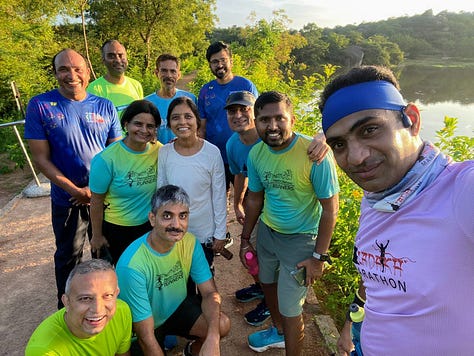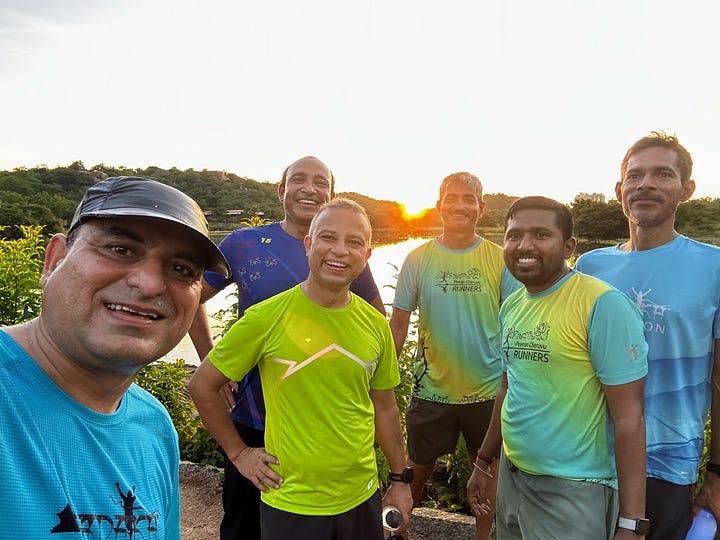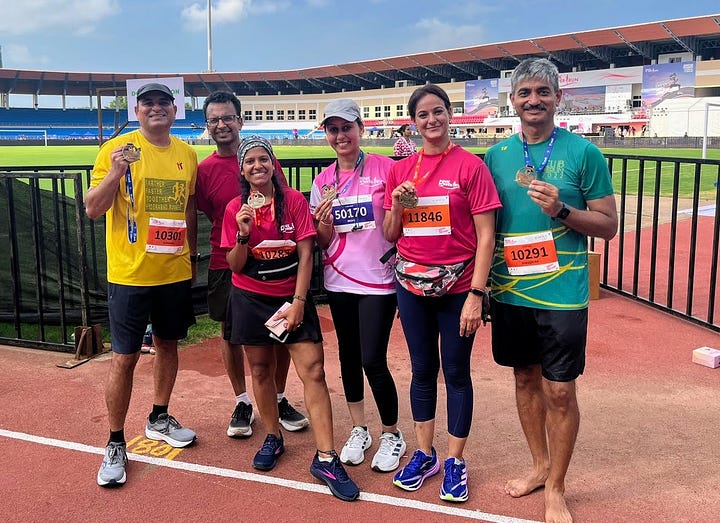After engaging with Quality Care Managers over last two weeks, it's clear that adapting to the changing buyer is critical for both products and processes. Customers are now driven by digital innovations and sustainability.
To meet these expectations, businesses must re-engineer not just the products they sell but also the service processes, ensuring technology integration and eco-friendly operations at every step. More on that later!
And, if somebody forwarded this email to you, please sign up for an awesome, dis-intermediated and fruitful relationship by clicking on following link and subscribing to the newsletter.
AND if you are a friend of the RPML, do share it with others. You can add more of your friends to the Community of Platform’ed by using the following link.
DTW
During the Week, Airtel finally embraced advanced digital solutions, an AI-powered spam filters, designed to detect and block unwanted messages. These filters intelligently sort through communications, ensuring only relevant and secure content reaches users.
On the first day of launch, Bharti Airtel’s AI-powered spam detection tool identified 115 million spam calls and 3.6 million spam messages, addressing a major issue for its 387 million mobile users. This feature operates without requiring a separate app download and works across all devices, allowing for real-time alerts on suspected spam.
Spam calls and messages are not only an inconvenience but also carry hidden costs by wasting user time and clogging up networks. With spam proliferating across messaging platforms, Airtel's AI tool aims to curb this rising problem effectively. The solution also aids regulators, like TRAI, in their crackdown on spam, providing a transparent system for monitoring.
According to a calculation by Cai & Robert using data from Carbon Literacy , for the top ten countries combined, spam emails produce 2,112 metric tonnes of CO2 every day, or 770,880 over the course of one year. In one day that’s equivalent to 5.2 million miles driven in a conventional gas car, or 1.8 billion miles driven over a year. That’s a lot of carbon for useless spam!
In today's fast-evolving world, the convergence of digital innovations and sustainability practices is transforming the way we live, work, and interact with our environment. As we increasingly rely on digital platforms and eco-friendly initiatives, the integration of these elements is not only reshaping individual lifestyles but also driving profound changes across communities, businesses, and nations. This shift is imperative for ensuring a more equitable, efficient, and sustainable future.
To start with, at the individual level, digital technologies are making sustainability more accessible and achievable. Whether it’s through personal fitness apps that encourage a healthier lifestyle or platforms that monitor energy consumption in our homes, digital innovations provide individuals with the tools they need to make eco-conscious decisions. For example, smart home systems powered by IoT (Internet of Things) allow homeowners to optimize their energy use by monitoring and controlling appliances remotely, reducing electricity waste and contributing to a greener planet.
Moreover, digital platforms empower people to actively participate in the sustainability movement by providing access to information and resources that were once out of reach. From apps that track one’s carbon footprint to platforms that encourage eco-friendly consumer choices, digital innovation serves as a catalyst for individuals to adopt sustainable practices in their daily lives.
We can strengthen our communities with Digital Connectivity and Green Initiatives where they can benefit immensely from the marriage of digital and sustainability efforts. With digital platforms such as social media and online community forums, local groups are able to organize, share resources, and build campaigns around sustainability practices. For example, community-driven initiatives such as carpooling apps or waste reduction platforms allow citizens to collaborate and share resources, ultimately reducing environmental impact.
Digital platforms also help bridge the gap between urban and rural areas, providing access to information and sustainable solutions for remote communities. Agritech platforms, for instance, offer farmers valuable insights into weather patterns, crop management, and sustainable farming practices. These innovations not only improve productivity but also promote environmentally friendly agricultural practices, leading to a more sustainable food system.
Like I mentioned at the start of the newsletter, digital transformation and sustainability go hand in hand for businesses. Companies that fail to embrace this shift risk becoming irrelevant in a world where consumers increasingly demand eco-conscious products and services. Digital platforms provide businesses with the tools they need to streamline operations, minimize waste, and adopt sustainable practices. From AI-driven supply chain management that optimizes resource use to cloud-based platforms that reduce the need for physical infrastructure, businesses are becoming more efficient while reducing their environmental footprint.
Moreover, adopting sustainable practices has become a key differentiator for brands. Consumers now prioritize companies that are transparent about their eco-friendly initiatives, and businesses are leveraging digital platforms to communicate their sustainability efforts. For example, online transparency dashboards allow customers to see a company’s carbon footprint and sustainability goals, fostering trust and loyalty among consumers.
At a national level, governments are increasingly adopting digital platforms to promote sustainability on a large scale. National digital public infrastructure (DPI) can be leveraged to encourage the widespread adoption of renewable energy, sustainable farming, and waste management practices. For example, government-backed digital platforms could provide citizens with real-time information on air quality, waste segregation, and renewable energy initiatives. These platforms can also be used to implement digital ID systems for individuals and businesses to monitor and report on their sustainability efforts.
In addition, national efforts to boost digital literacy and infrastructure can ensure that both urban and rural populations have access to the benefits of digital transformation and sustainability initiatives. By investing in eco-friendly digital technologies and platforms, nations can create new industries, foster innovation, and reduce reliance on finite resources such as fossil fuels, thus paving the way for long-term economic growth and environmental sustainability.
As a lead faculty at Centre of Excellence for Digital Transformation and someone who is deeply invested in research surrounding sustainability, I firmly believe that business schools have a unique and critical role to play in driving inclusive economic growth through digital transformation and sustainability. Based on our student engagement, research projects and industry engagement, here are a few pointers for future:
Curriculum Development: Business schools should prioritize integrating digital technologies and sustainability into their core curriculum. Courses focusing on Generative AI, Digital Transformation, Green Technologies, and the Circular Economy will equip students with skills relevant to a rapidly evolving digital economy. Additionally, business schools should emphasize experiential learning through projects that focus on real-world applications of digital and sustainable solutions. This will prepare future leaders to address global challenges with innovation and responsibility.
Research Focus: Business schools should lead research on the intersection of digital transformation and sustainability, exploring how digital tools can support sustainable practices and inclusive growth. Research could examine topics such as the role of digital platforms in reducing carbon emissions, or how sustainable business models can foster economic opportunities for underserved communities. By being at the forefront of this research, business schools can help shape policy and business practices.
Outreach and Extension Activities: Finally, business schools must engage with local communities and industries to drive change. They can do so by partnering with governments, NGOs, and businesses to deliver training programs focused on digital literacy and sustainability, especially for marginalized groups. By taking this proactive role, business schools can help bridge the digital divide, fostering greater inclusivity in economic development.
As we look toward the future, digital transformation and sustainability are not just goals, but essential forces for powering ourselves, our communities, businesses, society, and our nation. Business schools play a pivotal role through curriculum innovation, targeted research, and community outreach to develop leaders capable of leveraging technology for sustainable, inclusive growth. By integrating sustainability and digital integration, they can shape a generation of professionals ready to power our collective future. Together, through collaboration between academia, businesses, and communities, we can build a world driven by sustainable, tech-enabled solutions for equitable growth and progress.
OTW
Over the Weekend, on a bright Saturday morning ,the PeeranCheruvu Runners participated in Hyderabad Runners Monthly Meetup Run at Forestrek Park near own home. This meetup was extra special, as it was an opportunity to meet and celebrate the achievements of two of our fellow runners who recently completed one of the toughest marathons in the world—the Khardung La Challenge and Ladakh Marathon.
The Khardung La Challenge is an ultra-marathon held at an altitude of over 4000 meters, making it the highest ultra-marathon in the world. The 72-km long race tests a runner's endurance against extreme arid conditions and reduced oxygen levels at such heights. Our very own Santosh Sharma was among the brave souls who completed this challenge, successfully completing the 72 km ultra-marathon, followed by a full marathon in Ladakh. His determination and perseverance were truly inspiring for the rest of us. Karthik Ganti, another accomplished runner from PeeranCheruvu Runners, completed the Ladakh Full Marathon, overcoming the daunting high-altitude terrain and embracing the journey of pushing the human spirit to new limits.





The PeeranCheruvu Runners, as a group, are inspired by the stories of resilience and achievement shared by Santosh and Karthik. Their experiences at such an extreme altitude remind us all that running is not just about physical endurance but about mental toughness, patience, and belief in one's ability to keep moving forward in the face of adversity.
Then on Sunday, I ran a 10K at The Pink Power Run 2024 organised by The Sudha Reddy Foundation which is dedicated to health, child education, and women’s empowerment.




It was a great opportunity to participate in the Pink Power Run 2024, supporting the fight against breast cancer alongside so many inspiring individuals. Events like these are a powerful symbol of hope, strength, and solidarity for those battling breast cancer, survivors, and their families. The run route and the harsh sun made the event as one of the toughest 10K in Hyderabad but that amplified the challnegs faced by the those battling breast cancer, survivors, and their families.
Great initiative by the Sudha Reddy Foundation and more power to them in their mission of zero deaths from breast cancer. Let’s keep fighting, together!
I Love You
Shailendra





With the increasing demand for digital transformation and adoption of sustainability measures in the field, it truly is important the education curriculum starts including topics like these to not only create situational awareness but also to stay on top of the game.